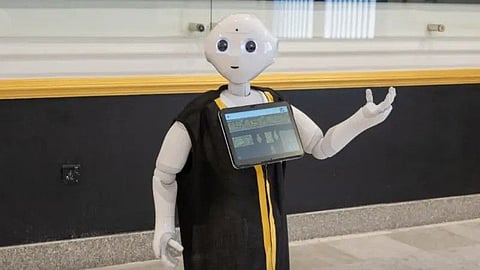Watch: Multilingual robot interacts with pilgrims at Kaaba Kiswa facility in Mecca
Machine can communicate in 11 languages, answers questions of visitors

Cairo: A multilingual robot has been unveiled, greeting Muslim pilgrims visiting a site for making the cloth cover or kiswa of the Holy Kaaba in Mecca in Saudi Arabia, according to a state Saudi television.
Al Ekhbariya TV showed the robot welcoming and briefing visitors to the King Abdulaziz Complex for the Holy Kaaba Kiswa.
The machine is seen reacting with and answering the visitors’ questions in Arabic on items on display at the complex.
The robot can communicate in 11 languages, according to the television that did not specify these languages.
The Saudi General Presidency for Affairs of the Two Holy Mosques has introduced several artificial intelligence-based services at the Grand Mosque in Mecca frequented by millions of Muslim worshippers.
The smart services include robots for sterilisation, disinfection, guiding visitors and pilgrims about rituals and providing fatwas (religious edicts) on queries.
As part of intensified efforts to keep the sprawling site clean, the presidency has said 11 robots are used in sterilisation works at the Grand Mosque, which houses the Holy Kaaba, ahead of this month’s Hajj pilgrimage.
Each robot can operate for eight hours without human intervention, the state agency has said.
Saudi Arabia, home to Islam’s two holiest sites, has put its Hajj-related agencies on maximum alert this year to ensure comfort for the large numbers of pilgrims who continue to arrive ahead of the rites.
Hajj, one of Islam’s five obligatory duties, is due in the final week of June this year. Muslims, who can physically and financially afford Hajj, have to perform it at least once in a lifetime.
Saudi Arabia has said there will be no limits on the numbers of pilgrims from around the world for the upcoming Hajj season, reversing earlier restrictions prompted by the global pandemic.
In the past two years, Saudi Arabia curtailed the numbers of Muslims allowed to perform Hajj to prevent spread of COVID-19. Around 2.5 million Muslims used to attend Hajj annually in the pre-pandemic times.



